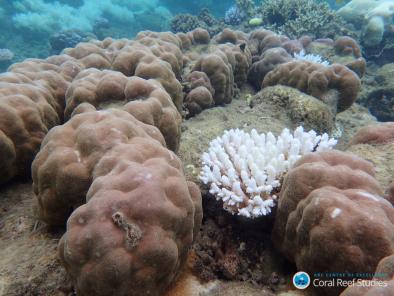Science Source
Climate change and coral reef bleaching: An ecological assessment of long-term impacts, recovery trends and future outlook
- States that, since the early 1980s, episodes of coral reef bleaching and mortality, due primarily to climate-induced ocean warming, have occurred almost annually in one or more of the world's tropical or subtropical seas
- Reviews the short- and long-term ecological impacts of coral bleaching on reef ecosystems using an extended dataset (25+ years), and quantitatively synthesizes recovery data worldwide
- Finds that there has been a significant overall recovery of coral cover in the Indian Ocean, where many reefs were devastated by a single large bleaching event in 1998
- Finds that in contrast, coral cover on western Atlantic reefs has generally continued to decline in response to multiple smaller bleaching events and a diverse set of chronic secondary stressors
- Finds that the majority of survivors and new recruits on regenerating and recovering coral reefs have originated from broadcast spawning corals with a potential for asexual growth, relatively long distance dispersal, successful settlement, rapid growth and a capacity for framework construction
Related Content
Headline

Apr 18, 2018 | Washington Post
Global warming has changed the Great Barrier Reef ‘forever,’ scientists say
Science Source
| World Weather Attribution
Great Barrier Reef Bleaching, March 2016
Science Source
| Proceedings of the National Academy of Sciences
Ocean acidification affects coral growth by reducing skeletal density
Nathaniel R. Mollica, Weifu Guo, Anne L. Cohen et al
Science Source
| PLOS ONE
Coral physiology and microbiome dynamics under combined warming and ocean acidification
Andréa G. Grottoli, Paula Dalcin Martins, Michael J. Wilkins et al


